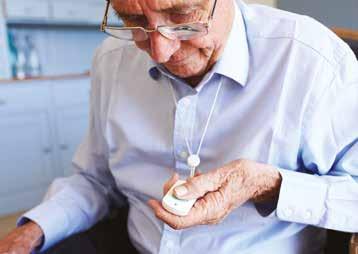
2 minute read
Care homes
All care homes and agencies providing care at home in England must be registered with the independent regulator, the Care Quality Commission (CQC).
The CQC inspects every care home and home care agency, publishing a report along with a rating. CQC quality ratings must be displayed at the operator’s premises and on its website. You can also find inspection reports and ratings for all services on the CQC’s website (www.cqc.org.uk ).
Types of care home
Care homes (personal care only)
If you need someone to look after you 24 hours a day, but don’t need nursing care, a care home offering only personal care may be the best option. Personal care includes bathing, feeding, dressing and help with moving. It is a good idea to have a needs assessment before you choose a care home to ensure it is the best way to meet your needs. See page 12 for more on assessments.
Care homes with nursing
A care home with nursing provides the same care and support as a care home offering personal care, but with 24-hour nursing staff on hand. If you think you may need nursing care in a home, you will need to be visited by a social worker or a care manager to work out what care you will need. This visit might be in your own home, or in hospital if you’ve been ill, or in a care home. You will be fully involved in planning for your care needs.
If, after a needs assessment, a care home providing nursing care is the best solution for you, a social worker will give you information to help you find a home which meets your care requirements. The cost of the nursing care part of your fees may be paid by the NHS to the home directly: the current amount is £187.60 per week. This figure may change over the lifetime of this Directory – check with Adult Social Care.
Activities in care homes
The word ‘activity’ can imply many things but, in the context of care homes, it should mean everything a resident does from opening their eyes in the morning until closing them.
Activities should stimulate residents emotionally, physically and mentally and, in a good care home, should encompass all aspects of daily life.
They can range from choosing what to wear, to helping with tasks around the home or garden, to listening to the radio or joining in with an art or exercise class.
Above all, activities provide a point of interest, fun and challenge to each day. They should enable people to participate in daily life, be engaged and maintain hobbies or activities they have enjoyed throughout their life, as well as offering the opportunity to try something new, if they wish. Lots of care homes now employ a dedicated activity co-ordinator, whose role varies from one home to another. Increasingly, they are fully integrated into the staff team, play a key part in developing care plans and ensure that all staff appreciate the part they play in delivering high-quality activities provision. Ensure you speak to any potential providers about the activities.







